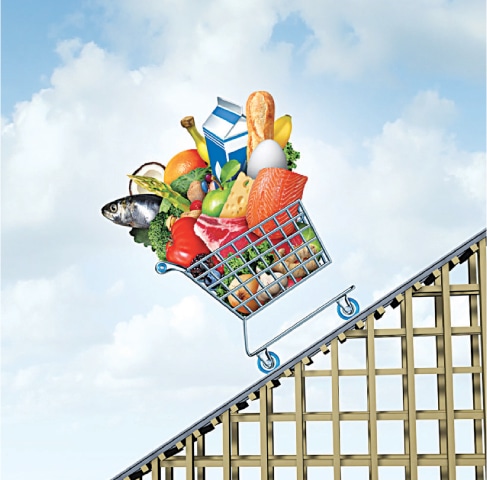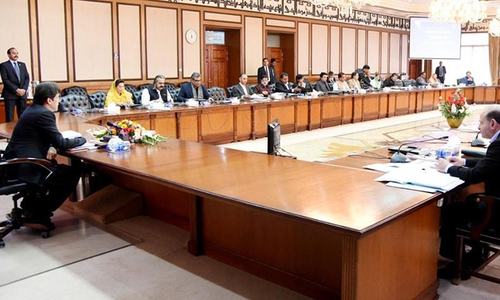
When food inflation spikes, the entire nation suffers and governments panic. They fear a loss of political capital.
That is why we see the government springing into action to rein in double-digit food inflation.
Food inflation does not erupt purely because of economic reasons. Powerful lobbies also trigger price hikes of essential food commodities like sugar and wheat by manipulating the markets. Sometimes, they play up with natural seasonal fluctuations in the supplies of widely used perishable vegetables like onions and tomatoes. In short, food inflation is often as much rooted in politics as in economics.
Primarily, provincial governments are responsible for monitoring prices and regulating food commodity markets. A tense relationship between the federal and provincial governments, however, creates room for lobbies to manipulate markets and trigger food inflation. The recent skyrocketing of wheat, wheat flour and sugar prices offers an opportunity to study food inflation in this context.
It is necessary for the provinces to strengthen district governments for a meaningful monitoring of commodity markets
The 18th constitutional amendment made during the Zardari era that put agriculture and other subjects in the provincial domain still remains controversial: the provinces complain it has not been implemented in letter and spirit and the federation claims it was passed into law without enough capacity building of the federating units. The provinces began exercising their control on agricultural affairs in 2010-11.
They were expected to make new laws, amend the existing ones and ensure a fuller implementation of both to improve the sorry state of agriculture. What we saw instead was no or little new legislation, no or not-up-to-the-mark amendments to existing laws, and a half-hearted implementation.
This also is one big reason for agricultural growth not picking up, commodity markets not behaving and the administration of the prices of essential food items remaining weak and wanting. On July 2, 2010, Sindh introduced the Sindh Wholesale Produce Markets (Regulation and Development) Act. This 10-page neat piece of legislation envisaged that “a grower may directly sell his agricultural produce in such manner and on such terms and conditions as he deems fit and shall not be required to sell such agricultural produce through, or at a notified market or a private market or any other market howsoever established.”
Ask any small grower in Sindh if he is really “free” to sell his produce. And his answer will be a flat no. This is just one example. But similar examples can be found in the relevant laws of Punjab, Khyber Pakhtunkhwa and Balochistan.
After the devolution of agriculture, the provinces have either failed in making fresh legislation for commodity markets or not ensured a fuller implementation of such legislation. In the post-18th amendment environment, it was also necessary for the provinces to strengthen and empower district governments to make price monitoring and commodity markets’ regulation meaningful. But that, too, has not happened.
Provincial governments failed miserably on this count. They not only blocked funding to local governments but also delayed their elections. Sindh, in particular, made summersaults with regard to retaining the local bodies system and allowing them to exercise the powers they were vested with. We all know how the superior judiciary had to intervene in this matter in not only Sindh but also Punjab and how the local bodies’ last election was finally held.
Following the passage of the 18th amendment, no serious effort could, thus, be made to contain food inflation through the prices’ administration owing to the absence of truly empowered provincial and local governments. This is another reason for commodity markets behaving erratically all the time and the prices of food items rising and falling more on the whims of hoarders and profiteers backed by powerful lobbies.
The Sindh Essential Commodities Price Control and Prevention of Profiteering and Hoarding Act of 2006 empowers the executive district officer (revenue) of the local governments for the implementation of this Act. But district governments seldom exercise this power — and when they do so, they fail to get the required cooperation from the provincial government. In the other three provinces, the Price Control and Prevention of Profiteering and Hoarding Act of 1977 still serves as the main legal apparatus for checking food inflation. Interestingly, the federal government also relies on this Act.
Ideally, all the provinces should have post-18th amendment provincial laws to deal with profiteering and hoarding. And ideally, the federal government should have come up with a comprehensive piece of law with a focus on coordinating with the provinces in price control.
The federal government’s policies on subsidies and exports and its control (or lack of it) on energy and agricultural input prices also affect food inflation directly. Food inflation cannot be checked effectively unless the federal government enhances the level of real-time input-seeking and coordination with the provinces. The sooner it is done, the better it will be. —MA
Published in Dawn, The Business and Finance Weekly, March 9th, 2020












































